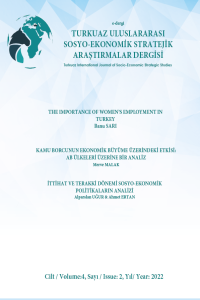CAN NEUROECONOMICS CHANGE THE TRADITIONAL ASSUMPTIONS OF RATIONALITY?
Adam Smith included the human psychology factor in his book "Wealth of Nations", which is accepted as the beginning of classical economics. Adam Smith also stated in his previous book “The Theory of Moral Sentiments” that the human psychology factor is not only the field of psychology but can also be subject to other fields such as economics. Traditional economic theory assumes that individuals make rational choices. However, when we examine the behaviours of the individuals, we see that individuals react to events mostly irrational and these differ from individual to individual since decision-making processes are affected by many biological mechanisms such as brain regions, neurons and genes. Even representatives of neoclassical economics, which use the concept of rational choice as an assumption have included psychological assumptions many times in their work. When we come to the beginning of the 21st-century psychologists and economists who study the development of psychology, neuroscience and decision-making have come together in a joint field of study. First, behavioral economics and then experimental economics, where both can be accepted as a sub-branch of economics, emerged. In the years following the development of these two fields, the field of neuroeconomics was born, whose purpose was to examine the neurobiological processes that affect decision-making. Neuroeconomics is an interdisciplinary field that brings together economics, psychology and neuroscience and aims to turn human behavior, specifically decision-making behavior, into a theory. Neuroeconomics, together with behavioral and experimental economics, tries to explain the points that classical economics cannot explain with the help of psychology, which classical economics ignores, but whose effects have a great impact on human behavior and can change the decisions taken. In this study, we firstly summarize the evaluation of neuroeconomics and then state our expectations about the future of neuroeconomics on the economy in the new world order of the 21st century.
Anahtar Kelimeler:
neuroeconomics, decision-making processes, behavioural economics, experimental economics
CAN NEUROECONOMICS CHANGE THE TRADITIONAL ASSUMPTIONS OF RATIONALITY?
Adam Smith included the human psychology factor in his book "Wealth of Nations", which is accepted as the beginning of classical economics. Adam Smith also stated in his previous book “The Theory of Moral Sentiments” that the human psychology factor is not only the field of psychology but can also be subject to other fields such as economics. Traditional economic theory assumes that individuals make rational choices. However, when we examine the behaviours of the individuals, we see that individuals react to events mostly irrational and these differ from individual to individual since decision-making processes are affected by many biological mechanisms such as brain regions, neurons and genes. Even representatives of neoclassical economics, which use the concept of rational choice as an assumption have included psychological assumptions many times in their work. When we come to the beginning of the 21st-century psychologists and economists who study the development of psychology, neuroscience and decision-making have come together in a joint field of study. First, behavioral economics and then experimental economics, where both can be accepted as a sub-branch of economics, emerged. In the years following the development of these two fields, the field of neuroeconomics was born, whose purpose was to examine the neurobiological processes that affect decision-making. Neuroeconomics is an interdisciplinary field that brings together economics, psychology and neuroscience and aims to turn human behavior, specifically decision-making behavior, into a theory. Neuroeconomics, together with behavioral and experimental economics, tries to explain the points that classical economics cannot explain with the help of psychology, which classical economics ignores, but whose effects have a great impact on human behavior and can change the decisions taken. In this study, we firstly summarize the evaluation of neuroeconomics and then state our expectations about the future of neuroeconomics on the economy in the new world order of the 21st century.
- Başlangıç: 2019
- Yayıncı: Manisa Stratejik Araştırmalar Derneği
Sayıdaki Diğer Makaleler
Ma ZAOMING, Frank Okai LARBI, Zheng FANG, Görkem DENİZ
FINANCIAL MANAGEMENT AND CORPORATE SOCIAL RESPONSIBILITY OF COMPANIES
AN ABOUT USING VECTORS IN MATHEMATICAL MODELING IN ECONOMY
Anarkul URDALETOVA, Syrgak KYDYRALIEV, Elena Sergeevna BUROVA
STRATEGIC ANALYSIS MODEL. PORTER'S 5 FORCES MODEL: CASE STUDY
CAN NEUROECONOMICS CHANGE THE TRADITIONAL ASSUMPTIONS OF RATIONALITY?
